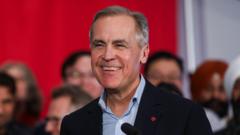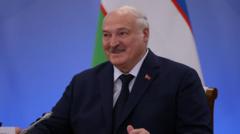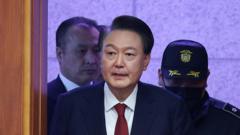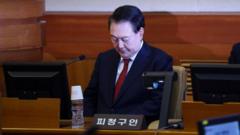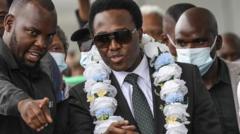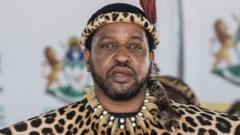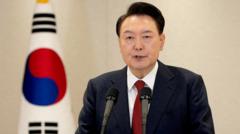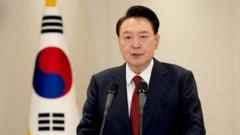Justin Trudeau faces mounting pressure from within his party and opposition as he navigates a turbulent political climate.
Trudeau's Christmas Dilemma: Is His Leadership Sustainable?
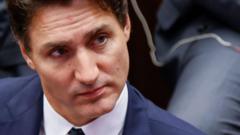
Trudeau's Christmas Dilemma: Is His Leadership Sustainable?
Canadian Prime Minister grapples with political crisis amid party dissent as Christmas approaches.
Trudeau’s Christmas Dilemma: Is His Leadership Sustainable?
Canadian Prime Minister Justin Trudeau is at a turning point during one of his most challenging weeks in office, just as the holiday season approaches. Attending the Liberal Party's annual holiday event, Trudeau attempted to maintain a positive demeanor despite facing significant challenges, including the sudden resignation of Finance Minister Chrystia Freeland, who stepped down just hours before a crucial economic address in Parliament.
While Trudeau's supporters within the party have become increasingly vocal about their frustration, he maintains a combative stance, drawing parallels between this tumultuous week and familial quarrels. Addressing attendees in his characteristic blue suit, he invoked themes of resolve and ambition, while launching thinly veiled critiques at Pierre Poilievre, the leader of the Conservative opposition. Political analysts noted that his remarks bore the cadence of a campaign address, suggesting Trudeau is prepared to fight back against growing calls for his resignation.
The challenge intensified when Jagmeet Singh, leader of the New Democratic Party (NDP), announced intentions to bring forth a motion aimed at dislodging Trudeau's government early in the new year. The collaboration with the NDP has previously been a lifeline for the Liberals. However, as speculation surrounding a potential election swirls, Trudeau's demeanor signals a determination to weather the storm. Although he mentioned to party members that a reflective break would be taken during the holiday period, there seemed to be no immediate plans for resignation.
Historically, Trudeau is no stranger to hardship and criticism. Early in his political career, the token phrase "Just not ready" haunted his campaign against long-standing Conservative leader Stephen Harper. Despite his youthful inexperience, Trudeau's character, often likened to that of his father, the late Pierre Elliott Trudeau, shows a propensity for resilience in the face of adversity.
Numerous scandals marred his time in office—most notably, the resignation of former Justice Minister Jody Wilson-Raybould in 2019 over allegations of political interference. Yet, Trudeau’s ability to endure political setbacks has led him to remain in power, distinguishing him as the longest-serving Prime Minister among G7 leaders despite facing declining popularity.
However, the whispering winds of change are apparent. Recent polling signals troubling prospects; nearly two-thirds of Canadians express discontent with Trudeau’s leadership, and only 26% support him as their preferred choice for Prime Minister. The headwinds from within his own party are equally daunting, with at least 18 Liberal MPs publicly advocating for his resignation.
New Brunswick MP Wayne Long recently articulated a bold stance, stating, "He's delusional if he thinks we can continue like this." He suggested a significant number of Liberal MPs share his sentiment. While some remain loyal, many more are wavering. Observers note that there is heightened resistance to Trudeau's leadership style and the underlying need for a fresh direction within the party.
Trudeau's refusal to yield against a backdrop of declining stability and forecasts that mirror historical antecedents could define his political legacy. Comparisons have been drawn to Donald Trump’s quick abandonment of campaigning in the United States, implying the need for immediate introspection within Trudeau’s camp. As Canadians anticipate the holiday season, the poignant question remains: Will Trudeau heed the call for a new beginning, or will he boldly resist the shifting tides? As the year draws to a close, the answer seems tangled in the same snowflakes that fell during his father’s fateful walk to relinquish power.
Canadian Prime Minister Justin Trudeau is at a turning point during one of his most challenging weeks in office, just as the holiday season approaches. Attending the Liberal Party's annual holiday event, Trudeau attempted to maintain a positive demeanor despite facing significant challenges, including the sudden resignation of Finance Minister Chrystia Freeland, who stepped down just hours before a crucial economic address in Parliament.
While Trudeau's supporters within the party have become increasingly vocal about their frustration, he maintains a combative stance, drawing parallels between this tumultuous week and familial quarrels. Addressing attendees in his characteristic blue suit, he invoked themes of resolve and ambition, while launching thinly veiled critiques at Pierre Poilievre, the leader of the Conservative opposition. Political analysts noted that his remarks bore the cadence of a campaign address, suggesting Trudeau is prepared to fight back against growing calls for his resignation.
The challenge intensified when Jagmeet Singh, leader of the New Democratic Party (NDP), announced intentions to bring forth a motion aimed at dislodging Trudeau's government early in the new year. The collaboration with the NDP has previously been a lifeline for the Liberals. However, as speculation surrounding a potential election swirls, Trudeau's demeanor signals a determination to weather the storm. Although he mentioned to party members that a reflective break would be taken during the holiday period, there seemed to be no immediate plans for resignation.
Historically, Trudeau is no stranger to hardship and criticism. Early in his political career, the token phrase "Just not ready" haunted his campaign against long-standing Conservative leader Stephen Harper. Despite his youthful inexperience, Trudeau's character, often likened to that of his father, the late Pierre Elliott Trudeau, shows a propensity for resilience in the face of adversity.
Numerous scandals marred his time in office—most notably, the resignation of former Justice Minister Jody Wilson-Raybould in 2019 over allegations of political interference. Yet, Trudeau’s ability to endure political setbacks has led him to remain in power, distinguishing him as the longest-serving Prime Minister among G7 leaders despite facing declining popularity.
However, the whispering winds of change are apparent. Recent polling signals troubling prospects; nearly two-thirds of Canadians express discontent with Trudeau’s leadership, and only 26% support him as their preferred choice for Prime Minister. The headwinds from within his own party are equally daunting, with at least 18 Liberal MPs publicly advocating for his resignation.
New Brunswick MP Wayne Long recently articulated a bold stance, stating, "He's delusional if he thinks we can continue like this." He suggested a significant number of Liberal MPs share his sentiment. While some remain loyal, many more are wavering. Observers note that there is heightened resistance to Trudeau's leadership style and the underlying need for a fresh direction within the party.
Trudeau's refusal to yield against a backdrop of declining stability and forecasts that mirror historical antecedents could define his political legacy. Comparisons have been drawn to Donald Trump’s quick abandonment of campaigning in the United States, implying the need for immediate introspection within Trudeau’s camp. As Canadians anticipate the holiday season, the poignant question remains: Will Trudeau heed the call for a new beginning, or will he boldly resist the shifting tides? As the year draws to a close, the answer seems tangled in the same snowflakes that fell during his father’s fateful walk to relinquish power.

